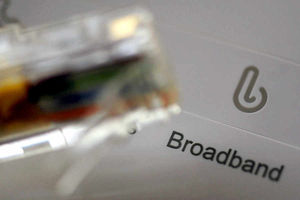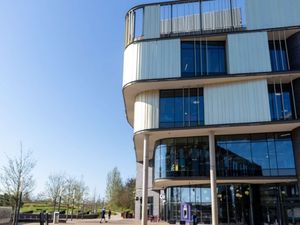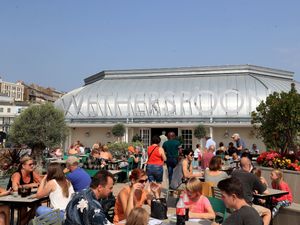Open letter: Dispelling the myths over Shropshire broadband links
Critics claim not enough is being done – or enough money spent on bringing superfast broadband to Shropshire. Today Shropshire Council's deputy leader Steve Charmley has his say.
"Today I want to dispel some of the myths perpetrated by detractors of the Connecting Shropshire Programme.
This is an 'open' letter to provide an update on our progress and aspirations for delivering better broadband to all the communities in the Shropshire Council area.

Contrary to reports we are very focused on achieving this and if there remains a need, the council will review investment accordingly.
The Connecting Shropshire programme remains a key strategic and priority programme of activity for Shropshire Council. It is fully supported by its funders and Shropshire Council has invested more than £9 million in capital and revenue into the programme up to 2016.
It remains a key enabler of service transformation, supports our local and LEP business economy and is no longer a luxury but a necessity that all our communities expect.
As a reminder Shropshire Council has, through diligent work, secured funding towards broadband infrastructure in Shropshire of £26 million in Phase 1 and £17 million in Phase 2.
State Aid – how we use public money – remains a key constraint within the national government BDUK (Broadband Delivery UK) programme. It is important that the State Aid rules are appreciated as they have a significant impact on the procurement opportunities and method of delivery.
Any failure to meet the State Aid conditions can potentially put the authority in breach of European legislation, which places a risk that competitor suppliers can challenge our contract and delivery methodology. The key conditions of the scheme place the following obligations upon the authority:
Public funds cannot be used to build infrastructure in areas where commercial providers have plans to build their networks.
The money has to be spent on deploying superfast broadband (at least 24 megabits per second) to as many premises as possible. We cant spend on deploying to more premises at lower speeds.
The network must be "open" and allow for choice of retail providers to maintain competition in the ISP market.
The solution must be robust and be scalable to service the speed requirements of network users. Wireless technologies, although now supported, have more technical challenges around resiliency and capacity. Most importantly any solution requires the incumbent supplier to ultimately deploy a fixed fibre solution when it is economically viable to do so. This, for obvious reasons, is financially challenging.

Progress on Phase 1:
Delivering fibre broadband is a significant engineering challenge that involves a partnership approach. Fibre cable is taken from "head-end" exchanges, which in most cases are located in market towns, and is "rolled out" to new cabinet locations. This takes time, requires road closures and, in many cases needs new ducts and cables.
The programme remains "on target" in its current Phase 1 delivery that started in March 2013 and is due to complete by winter 2016. Phase 1 aims to deliver superfast broadband to 87 per cent of premises, when added to commercial providers' obligations.
To date we have delivered to over 35,000 premises (out of 64,000), all of which now have access to fibre enabled service. Average speeds across the 180 cabinets already built is on average 50 megabits per second. Phase 2:
Prior to procuring our Phase 2 delivery the council undertook due diligence with the supplier market to assess potential procurement, delivery and financing opportunities. At that time, and for the reasons outlined in the December 10 2014 report, Cabinet decided to undertake a further BDUK framework procurement exercise using the secured £11.38 million from the Department for Culture, Media and Sport.
The purpose of the BDUK grant funding was to take Shropshire to at least 90 per cent superfast broadband coverage locally, which remains a government target by the end of 2017.
BT's contract, which was signed and reported earlier this month will use £4.7 million of the total £11.38 million funding from BDUK. It will be used to provide another 4,000 premises with access to fibre broadband across a range of areas in Shropshire. We will release a map before the end of this month, showing the areas that will benefit as part of Phase 2.
Whilst the bid may be perceived as disappointing in not addressing solutions to more premises in the intervention area (15,500 premises), the "outcome" from this procurement process is as expected and outlined in the Cabinet paper of December which remains in the public domain.
The supplier's solution model has utilised the same technologies as in Phase 1. Beyond Phase 2:
We now have a balance of BDUK funds of £6.68 million that can be used together with the Marches Local Enterprise Partnership's Local Growth Fund allocation of £5.02 million. We intend to use this funding towards a further procurement exercise. At the same time we will continue to explore options with our partners BT as part of the process, but not under exclusivity and with no obligations on the authority.
The unallocated funds provide Shropshire Council with a clear opportunity to reassess the wider market as outlined in the December paper. It is anticipated that the process of "soft market" testing will encourage "procurement competition" and the use of new technologies which will be essential to providing greater reach to those most impacted by the lack of fibre broadband coverage.
Additional Opportunities:
We continue to look for further investment opportunities through private and community investments. Our Phase 1 and Phase 2 contracts provide opportunities to extend coverage and these will be explored through work with our Broadband Partnership group, which meets later this month.
We are expecting more calls for LEP opportunities as part of a further local growth funding. The authority remains committed to assessing these options and those from European funding streams prior to committing its own capital funding. This remains a clear and sensible strategy when the authority is faced with significant funding constraints.
The Superfast Britain connection voucher scheme has now been available in Shropshire since April. We formally released information about the scheme and process last week and we intend to hold an event in Shirehall next month with a number of infrastructure providers. We would encourage all local businesses to take up this complimentary project which could provide opportunities to get a superfast broadband connection straight away.
Connecting Shropshire regularly provides updates to key stakeholders via the website, parish meetings, briefings, press releases and newsletter. We are happy to receive any suggestions and assistance from members in spreading the word about the benefits of fibre broadband to encourage residents and businesses.
It remains our aspiration that we maximise the take-up of fibre broadband within the 10-year contract term as anything above 20 per cent will result in a financial reward to the council via the contract that we have with BT. This can be reinvested in the programme.

Summary:
The Connecting Shropshire programme remains in a very positive position with delivery on schedule to cost and timescale. We have procured some additional coverage as part of Phase 2 and are now looking forwards to further coverage opportunities with the support of BDUK. We additionally have secured an interim voucher scheme that can assist local businesses to immediately take up superfast broadband.
Throughout deployment the Connecting Shropshire Team have always provided an "open"and "honest" approach to communication. This remains a key element to our communication strategy and hence why we created the Broadband Partnership Group . This will continue to be the forum to have conversations about the programme and not via the public media, which appears in some cases to be a tactical ploy by those who do not agree with our strategy.
While some may not agree with our strategy this does not mean that our strategy is wrong."





